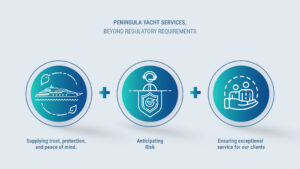
As environmental regulations evolve across key maritime regions, many yacht owners and operators are asking whether these changes will impact their operations. The answer, for most yachts, is no. Yachts typically burn marine gasoil with 10 ppm sulfur content, already well within regulatory limits.
But at Peninsula, we view compliance as a baseline, not the goal. While new rules may not directly affect the yachting sector, we take this opportunity to highlight how we go beyond regulatory requirements to reduce risk and ensure exceptional service for our clients.
Know Your Customer (KYC) and Financial Vetting
We’ve all heard of KYC—Know Your Customer—a cornerstone of due diligence in financial services. At Peninsula, we apply the same rigorous approach to our supply partners. “Know Your Supplier” is more than a checklist; it’s a strategic safeguard.
Every supplier is thoroughly vetted through a detailed KYS process. This includes ownership checks, sanction screening, and a financial health review. These measures help ensure we avoid doing business with sanctioned entities or financially unstable companies that could default, disappear, or underdeliver.
The implications of a failed delivery go beyond inconvenience. If a supplier disappears at the last moment, there’s no guarantee an alternative can deliver within the same time frame. This can create serious knock-on effects, potentially delaying the start of the next charter or private voyage.
Fuel Origin and Quality: Why These Checks Matter
The yachting industry often overlooks two critical but distinct concerns when it comes to fuel: origin and quality. These aren’t standard industry requirements, but we believe they should be.
Fuel Origin
There’s increasing scrutiny around the geopolitical and ethical implications of fuel sourcing. While the risk to owners/operators from sanctioned-origin product is relatively low, the reputational damage from being connected—even unknowingly—to a sanctioned supply chain can be significant. That’s why we require our suppliers to confirm that none of their product originates from sanctioned countries or entities—not just per delivery, but as a blanket compliance requirement.
Fuel Quality
Contamination issues are more common than many think—particularly bacterial growth in storage tanks. Flashpoint concerns, though rarer, can also be dangerous. These are preventable problems when proper quality controls are in place. By setting clear expectations and validating supplier performance in advance, we minimise the likelihood of these risks impacting our clients.
Clear Terms and Conditions That Protect the Yacht
The terms and conditions of supply make up the contract between the purchaser and the seller. It is essential these terms are understood and aligned with the customer’s requirements. Should something go wrong, these terms will dictate how issues are resolved and what compensation may be due.
We ensure our clients are protected through clear, robust contractual structures. This includes the ability to support yachts even when issues—like bacterial contamination—fall technically outside the narrow scope of a quality claim. Why? Because we’ve established deeper engagement and communication with our suppliers from day one. These aren’t generic vendor relationships; they’re risk-managed partnerships built to protect the end customer.
Territorial Risk Awareness
We actively manage exposure by assessing the legal and operational risks of each territory. In some cases, we deliberately avoid working with suppliers in regions where the enforcement of contracts or compliance standards is weak. While this may limit supplier options, it significantly reduces the risk of future issues and enhances our offering to our customers.
What the Industry Often Misses
At Peninsula, due diligence isn’t just a box we tick — it’s a core part of how we deliver a consistently high standard of service. While others may respond only when issues arise, we take a proactive approach to risk management, ensuring problems are prevented before they ever have a chance to develop.
There’s a general lack of awareness in yachting about just how exposed some operators are. One example is securing fuel on credit—if the supplier fails, the yacht could be left stranded. Another scenario is the use of a new, unvetted supplier who fails to deliver on time, compromising the itinerary or charter schedule.
These are just two examples. The reality is that there are countless low-probability, high-impact risks out there—and our job is to prevent them.
Due Diligence Isn’t an Option—It’s a Standard
From KYS and fuel origin validation to quality control, contract clarity, and territorial risk management, every layer of our process is designed to protect the yacht and remove uncertainty from fuel supply.
Peninsula Yacht Services isn’t just supplying fuel—we’re supplying trust, protection, and peace of mind. This level of diligence shouldn’t be left to chance. It should be the expected standard for the yachting industry.
And while others may struggle to match it, we believe customers should not only expect this level of service—but demand it from every supplier they work with.



